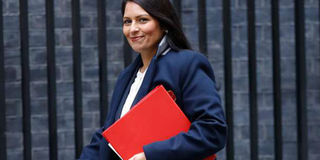Battle of Westminster sets State against its own civil servants

A senior British minister Priti Patel arrives at 10 Downing Street for the weekly meeting of the cabinet in central London on October 31, 2017. PHOTO | TOLGA AKMEN | AFP
What you need to know:
- Ms Patel attended Keele University, where she studied economics.
- Matters came to a head soon after her appointment to the important Cabinet portfolio of Home Secretary.
Priti Patel, a senior British minister with roots in East Africa, has become the focus of a rare dispute which pits Premier Boris Johnson’s new government against its own civil service, those anonymous officials who effectively run the country.
In allegations that date back to her first ministerial appointment in 2015, Ms Patel has been accused of bullying subordinates and senior civil servants alike. Claims include throwing a folder at an aide because a document was missing, shouting, “Get out of my face” at others and briefing reporters against officials on her own staff.
Matters came to a head soon after her appointment to the important Cabinet portfolio of Home Secretary.
UNPRECEDENTED
Her top official at the Home Office, Sir Philip Rutnam, announced his resignation before TV cameras claiming he had become the “target of a vicious and orchestrated campaign” which he accused Patel of orchestrating.
Noting that she had denied such activities, he declared bluntly, “I regret I do not believe her,” and announced that he would sue the government over his dismissal — a move which parliamentary historians described as “astonishing” and “unprecedented.”
Rutnam said he had tried to reconcile with Patel at the request of the Prime Minister, “but despite my efforts to engage with her, Priti Patel has made no efforts to engage with me to discuss this.” Ms Patel was born in London in 1972, her parents having emigrated from Uganda in the 1960s, several years before Idi Amin expelled Uganda’s Asians.
The family established a chain of newsagents in London and the southeast of England.
Ms Patel attended Keele University, where she studied economics. She joined the Conservative party as a teenager and was elected MP at the 2010 polls.
CONFLICT
The Patel-Rutnam row is part of a larger conflict in which radical Tory MPs and advisers have declared war on certain established institutions, primarily the BBC, the Judiciary and the civil service.
They are accused of being fuddy-duddy, slow and a restraint on progress. The leader of the ginger group, an unelected adviser, Dominic Cummings, has described the civil service as “the blob,” and the Mafia-style language concerning the BBC is that it will be “whacked.”
How far this confrontation will go is a matter of conjecture — and right now, the government is more concerned with measures against the coronavirus. But it might be well advised to take heed of the words of a senior parliamentary watcher: “A government that treats its officials as enemies will rapidly turn them into actual enemies.”
*****
One of the nastier products of the information revolution is what people are calling sextortion — basically, extortion or blackmail over sexual imagery.
Usually, people are coaxed into performing sex acts on a webcam or a phone, then the person they think is their friend or possible future partner demands money under threat of plastering the images all over Facebook.
In one case, a victim received an e-mail saying malware had been placed on their computer, with a warning that their pornographic viewing habits would be leaked to the world unless they paid up.
Social media is the main platform for the sextortionists, with Snapchat, Facebook and Instagram all popping up among complaints.
SEXTORTION
The crime is on the rise throughout Britain and one region, Northumbria, is recording a doubling of incidents year-on — year. However, police see a glimmer of light here. A spokesman said, “Crimes such as sextortion have been underreported for a long time because victims feel embarrassed about coming forward. However, in recent years we have seen more people with the confidence and support to come and report these crimes to us.”
***
Considering the nervousness about coronavirus, it was not surprising to see the following on social media: “Beware! The virus can be carried by currency notes and coins.
In the interests of your own safety, put all your money in a sealed plastic bag and leave it outside your front door. I will collect it in the morning.” I seriously doubt if anyone fell for this con, or more likely, joke … but you never know, do you?
***
Last of our church notices: Easter Sunday is approaching and we have arranged for Mrs Lewis to come forward and lay an egg upon the altar. Ladies, don’t forget the rummage sale on Friday. It’s a chance to get rid of those things you no longer want. Bring your husbands. The Rector will preach his farewell sermon, after which the choir will sing, “Break Forth in Joy.”
Amen!
***
Finally, next Tuesday, March 17, is the feast day of Saint Patrick, patron of Ireland, so in honour of my ancestors, here is an Irish toast: “There are good ships and there are wood ships, the ships that sail the sea. But the best ships are friendships and may they always be.”





